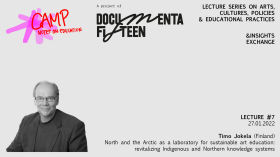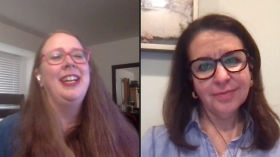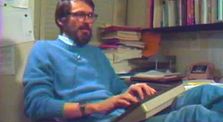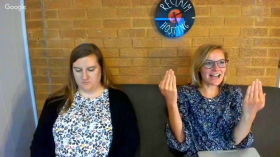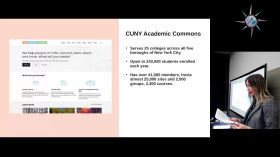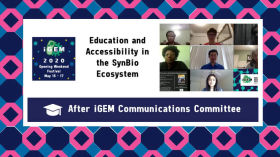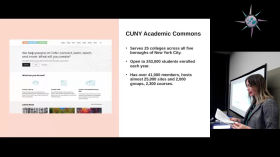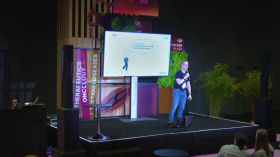4180 videos
Lecture Series #7 - CAMP notes on education
Prof. Timo Jokela (Finland)
North and the Arctic as a laboratory for sustainable art education: revitalising Indigenous and Northern knowledge systems
Timo Jokela is Professor of Art Education at the University of Lapland and currently leads...
Taxes Are Theft and Surplus Value Of Labor
In this video we discuss the ways politicians and the elite rob and steal from you.
Donate to my Patreon:
https://www.patreon.com/deadheadanimation
Get Anarchist Merch at my Store:
https://teespring.com/stores/reeducation-2
Go to my linktree fo...
Taking Care: Affective Labor in Digital Learning
Openness can be fraught for faculty; the classroom has often been a sanctuary of academic freedom and teaching approaches are personal in the strongest sense. In preparing our faculty for the Fall 2020 semester, we, as faculty developers and acade...
AT&T Archives: The UNIX Operating System
In the late 1960s, Bell Laboratories computer scientists Dennis Ritchie and Ken Thompson started work on a project that was inspired by an operating system called Multics, a joint project of MIT, GE, and Bell Labs. The host and narrator of this fi...
009: Sparking Conversations
Meredith and Lauren chat about Spark, a favorite email client. (More info: https://sparkmailapp.com/)
Blog post mentioned: https://labrumfield.com/saving-email-responses-using-signatures/
(1954) "The Search" : Automatic Robots & Digital Computers
This film is an episode of ‘The Search’ a pioneering educational program that aired on CBS. This episode takes a look at the laboratories and plants that pioneered the development of automatic machines in 1954. It takes a tour through the Massachu...
Education and the future of software freedom
LibrePlanet 2023 videos
Presented by: Erin Rose Glass
Erin Rose Glass is a researcher and educator who has worked across universities, community colleges, academic libraries, and industry to promote technical literacy focused on ethics, user governance, and community values. She has co-founded a variety of community-driven ed tech initiatives that center ethics and user freedom, including Social Paper, a platform for socializing student writing funded by the National Endowment for the Humanities, and KNIT, a digital commons shared between UC San Diego and the San Diego Community College District. Her research publications focus on the intellectual and political stakes of digital infrastructure related to education and research, including her dissertation, Software of the Oppressed: Reprogramming the Invisible Discipline, which examines the history of ed tech in higher education through Paulo Freire’s philosophy of critical pedagogy. More recently, she led the Developer Education team at DigitalOcean before joining Chainguard, a start up focused on software supply chain security. She lives in California with her family and pack of fluffy creatures, big and small.
Description:
As the political stakes of digital technology become increasingly apparent, it’s clear that an ethical approach to software use and development is more important than ever. While a number of organizations and advocates are doing important work to advance ethical forms of software practice, we continue to miss one of the key sites where software habits and expectations are reinforced and normalized at scale, that is, institutions of education.
In this talk, I will discuss the inadvertent role higher education plays in teaching students to passively accept broad forms of digital surveillance and control through its use of popular educational technologies like learning management systems, word processing software, and test taking tools, and how this submission leads to the broader mass helplessness in the face of current technological struggles. Starting with my chance encounter with free software as a humanities graduate student, I will highlight a range of promising contemporary examples of experiments in higher education that push against exploitative trends in educational technology and expose students to the differentiating value and possibility of software freedom. As we chart the course of the future of software, these examples shine light on the importance of educational institutions in the struggle for software freedom and the urgent need for broader community support to help sustain and encourage these precarious endeavors.
Education and Accessibility in the SynBio Ecosystem - iGEM 2020 Opening Weekend Festival
Panel discussion on important initiatives to make synthetic biology accessible and inclusive, and increase public engagement to make it more understandable to a wider audience. Topics will include language barriers, gender dynamics in scientific s...
Education and the future of software freedom
Presented by: Erin Rose Glass
Erin Rose Glass is a researcher and educator who has worked across universities, community colleges, academic libraries, and industry to promote technical literacy focused on ethics, user governance, and community ...
Education and awareness
Talk about the Human Practices aspect of our project. How we have tried to create more awareness on Endometriosis as a disease and actually listen to the women suffering. How we have tried to educate people on endometriosis and synthetic biology a...

